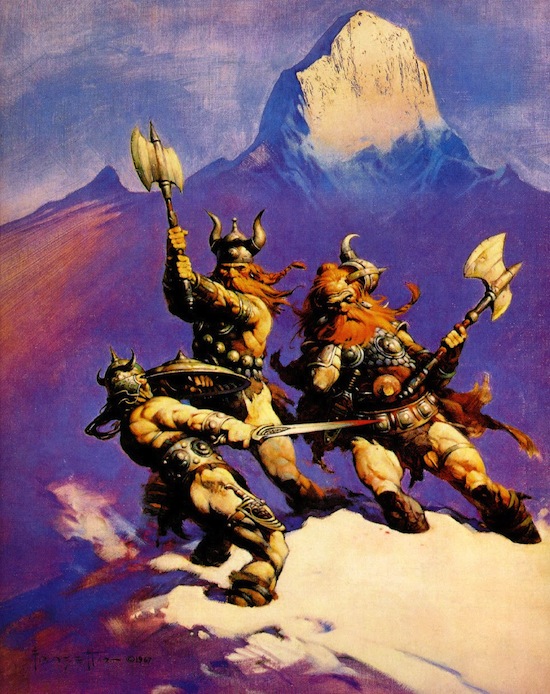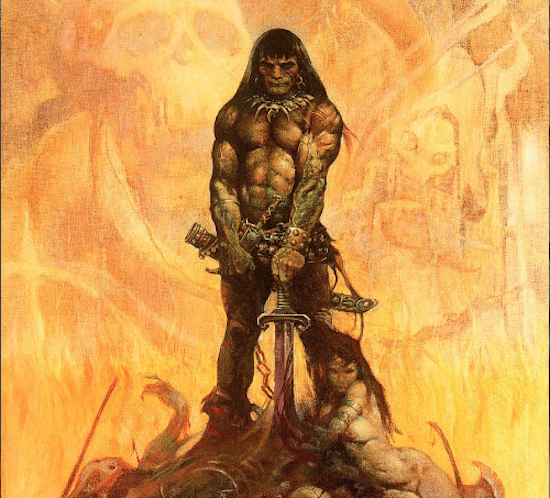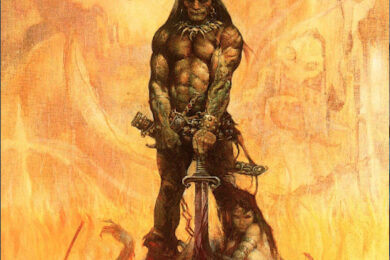“Know, O prince, that between the years when the oceans drank Atlantis and the gleaming cities, and the years of the rise of the Sons of Aryas, there was an Age undreamed of, when shining kingdoms lay spread across the world like blue mantles beneath the stars…. Hither came Conan, the Cimmerian, black-haired, sullen-eyed, sword in hand, a thief, a reaver, a slayer, with gigantic melancholies and gigantic mirth, to tread the jeweled thrones of the Earth under his sandaled feet.”
The Phoenix On The Sword, which appeared in the monthly pulp anthology Weird Tales eighty years ago this week, was the first of Robert E Howard’s twenty-two canonical Conan stories to be published, establishing the ground rules of the sword and sorcery genre, and it opened with the above quote. Fifty years later, a garbled version of the same epically functional introduction was intoned by a growling character actor in the opening moments of the 1982 movie Conan The Barbarian. It followed a flash of the Nietzsche epigram, “That which does not kill us makes us stronger”, an appropriate thought to bear in mind while enduring Schwarzenegger’s titular performance, and the high camp Nazism of screen-writer Oliver Stone’s script.
But it was Schwarzenegger’s reading of the character that sealed Conan in the global consciousness as a kind of sentient Wagnerian super-ape, a tragedy from which neither the fictional barbarian himself, nor the reputation of his creator Robert E Howard, has ever quite recovered. Howard, a Texan loner who rarely left the Lone Star State and lived with his parents, committed suicide in 1936 at the age of 30, having contributed 160 or so serialised stories and novellas to the popular pulp magazines of the day, unloved in his lifetime, his fame growing incrementally in the ensuing decades.
Returning, at the request of The Quietus, to the works of a once favorite writer I’ve read little in the last thirty years, I was relieved that my high estimation of Howard’s abilities wasn’t entirely the result of youthful ignorance. But to understand my relationship with Robert E Howard, and that of a whole generation of readers, you have to make a long journey, to another age undreamed of, before polytechnic media studies courses dissolved the barriers between high and low culture, before Wikipedia gave seekers the tools to tie together the disparate strands of forgotten writers’ work, and before Amazon made every lost book a mere tax-avoiding mouse click away – the 1970s.
Sometime in the early years of that grey-glo decade, around the age of six, I stood on my two tiny feet in a newsagents in Shirley, Birmingham, and span a rack of True Detective Magazines, the lurid low-hanging fruit of 1970s pornography and American comic books, all then considered part of the same degenerate inky backwash, way before super-hero books had stores that sold them specifically to smitten fans, as a legitimate outgrowth of popular culture. I chose a Captain Marvel, became a convert, and was soon reading Marvel Comics’ Conan adaptations. In the summer of ’75, a 50p Conan ‘Treasury Edition’ included, amongst Barry Windsor Smith’s delicate pre-Raphaelite illustrations, a lengthy essay by the strip’s writer Roy Thomas on his debt to one Robert E Howard, who had originally invented the character. Pretty soon, age eight or so, I was scoping out paperbacks of Howard’s work, ditching Roald Dahl and Alan Garner for my first forays into supposedly adult fiction, even if it was full of dragons, demons, sorcery and swords.
Back then, Howard was still racked and filed with rubbish and filth, in paperback editions stacked alongside James Hadley Chase sex thrillers and New English Library skinhead and biker exploitation books. The idea that thirty-five years later there’d be a respectable Penguin Modern Classics selection of Howard’s stories was an impossible pipe dream. Conan was an oddly moral mercenary who bestrode the globe in a fictional time-zone. Howard’s final and most fully-realised character was the result of a four year splurge yielding nearly two dozen stories, and he was now quietly popular. You could find the Sphere paperbacks in WHSmiths. But the barbarian was particularly poorly served by the anthologies that collected his adventures.
During the decades that Howard was forgotten, a pair of peculiar writer-fans, Lin Carter and L Sprague De Camp, tossed off their own tributes to Howard’s then largely unknown work (Thongor The Barbarian and The Tritonian Ring respectively) and, in the ‘60s, they set about ‘editing’ and improving Howard for public consumption. Bulking out the tales into substantial books, adorned with eye-catching and era-defining Heavy Metal Frank Frazetta cover paintings, doubtless helped to sell them, but to the detriment of the purity of Howard’s style and vision.
At the risk of over-stating the case, Howard remains the Robert Frost of the sword and sorcery genre he established, writing plainly and directly with incredible power, as if Conan, Howard wrote to Clark Ashton Smith in 1933, “had been standing at [his] shoulder directing [his] efforts.” But Howard’s 60s editors introduced faux-archaic turns of phrase into Howard’s perfectly serviceable prose, whilst their own unauthorised additions to Howard’s story cycle – justified as attempts to plug narrative gaps in the chronology – were marred by clichés Howard usually avoided, at least in his later years. (De Camp and Carter’s Black Tears, which besmirches the beginning of Sphere’s Conan The Wanderer collection, pictures the sun baking the desert sands ‘as in a giant oven’.)
But somehow, even to my eight year old mind, the unadulterated Howard shone through, the shimmering battlefield aftermath vision of The Frost Giant’s Daughter, best enjoyed unedited in the Gollancz Conan Chronicles volume I, remaining especially vivid. Howard somehow intuited the ebb and flow of Norse Eddas and Anglo-Saxon verse, though culturally far removed from them; “The clangor of the swords had died away, the shouting of the slaughter was hushed; silence lay on the red-stained snow.” Who knows what Howard read in the library of his Cross Plains home? Keats, Kipling and Jack London, certainly. Perhaps The Seafarer and The Wanderer also.
Beyond the Conan collections, Howard’s other work was harder to find, but I remember long Seventies school holidays sat on a beach at Budleigh Salterton, where my dad’s parents lived in South Devon, outside a breezeblock hut that sold cans of Coke and heavily discounted paperbacks with curled corners. I supposed the Conan tales, their hero utterly free to pursue his own desires, may have appealed especially to an only child stranded at the seaside between divorced parents, and I remember with particular pride how the lurid prose on the back of Sphere’s third Conan collection – “furious dreams of danger and power and unending adventure, of combative and sexual prowess, or hot impulses instantly followed” – sparked an argument in which my grandparents accused my mother of neglecting my moral development. What better way to encourage voracious reading than to make it appear forbidden?

In the Budleigh beach shop Howard obscurities would peak out between Howard rip-offs, like John Jakes’ Brak The Barbarian, and the full extent of his oeuvre became clear. The stories of Brak Mak Morn, Cormac Mac Art, Francis Xavier Gordon and Solomon Kane, the latter recently adapted into an abysmal film, cut swathes through identifiable historical eras; Panther books’ Skull-Face series and Granada books’ Dark Man Omnibuses compiled Howard’s horror fiction; and there were westerns, hard boiled detective tales and even a boxing series. I read them all. But as I moved into my teens, to my great regret and shame, I think I began to feel I was too good for Howard.
Those same seaside paperback stashes led me into the sophisticated science-fiction of Ray Bradbury. And reading The Hobbit drew me into Tolkien. In retrospect, I think I found Tolkien’s fantasy respectable in some way, which appealed to my vain sense of my own maturity. I knew he was a professor so presumably he wrote of dwarves and dragons by choice, from a position of strength, informed by his undoubtedly sweeping knowledge of myth and fable. Howard, I assumed, snobbishly, was an uneducated American auto-didact, who wrote of barbarians and beasts because he knew no better. And I turned my back on him. (Today, Howard seems infinitely preferable to Tolkien in whose bloodless and sexless books females, for example, are all but invisible. Far more preferable the passionate, if implausibly pliable, she-warriors of Howard’s realms.) And when I was thirteen or so, our English teacher Mr Melhuish, operating off-piste and beyond the official curriculum as teachers could thirty years ago, read us the whole of Albert Camus’ The Outsider over the course of two double English lessons and I left fantasy behind for French existentialism. And beyond.
Howard’s broadsword-wielding hero Conan would have had little time for the idle musings of post-war French intellectuals, being suspicious generally of the benefits of civilization. But I sometimes wonder if Conan hadn’t already prepared the pre-pubescent me for teenage consumption of Sartre and Camus. In Queen Of The Black Coast, the 1934 novella in which Conan loses his heart to a female pirate called Belit, his doomed lover asks him if he believes in life after death. Conan replies; “Let teachers and priests and philosophers brood over questions of reality and illusion. I know this: if life is an illusion, then I am no less an illusion, and being thus, the illusion is real to me. I live, I burn with life, I love, I slay, and I am content.” Oliver Stone’s movie script made the obvious choice of portraying Conan as a one-dimensional Nietzschean overman. Howard had already shown him to be a two-dimensional left bank existentialist.
Cherry picking fragments from my old paperbacks again over the last month, I am surprised how much of Howard seems relevant. The Conan tales picture a world of supposedly civilised nations fighting with superstitious ones, in battles for territory and resources. Red Nails, which I think may have been Howard’s final Conan tale, shows two warring and dwindling tribes hiding at opposite ends of a sunless and sealed necropolis, hell bent on each other’s destruction. As a metaphor for the modern human condition it’s up there with William Golding’s Lord Of The Flies and unlike Golding’s celebrated 1954 effort, is also enlivened by a gratuitously Sapphic girl-on-girl whipping scene.
The Jacobean 1936 cowboy yarn The Vultures Of Whapeton is, as John Clute points out in the introduction to Penguin’s Heroes In The Wind selection, “ostensibly a Western tale but… we are left with a sense of the profound entrapping starkness of the world … the tale systematically strips every character of any pretence that their ‘civilisation’ is anything but a sham.” As with Oakley Hall’s McCarthy era western Warlock, Howard uses the old Zane Grey shoot-out template to tell a different story, and reading Howard again now it’s tempting to see other stories bubbling up through the translucent surface of his purple pulp.
Like H.P. Lovecraft, with whom Howard corresponded, and who allowed Howard to co-opt some of his ‘eldritch Gods’ into Conan’s cosmology, Howard’s tales sometimes seem to embody a palpable, physical disgust at the human capacity for cruelty. Lovecraft imagined we were but playthings of evil primordial deities. Howard leavened his horror with the savage nobility and essential morality of his heroes and heroines. Both envisioned the unspeakable in the form of crawling multi-tentacled pit-dwelling obscenities with ugly garbled names. Of course, less than a decade after the two writers’ deaths, came Hiroshima and the Holocaust. There were no eldritch forces determined to destroy us. The reality was far worse than that.
Howard still dwells in a hinterland of sorts, without the gate of the walled citadel of culture. Having been written by a 1930s Texan, his stories can often seem racist and sexist, probably because Howard himself was racist and sexist, by our standards. But Howard took issue with Lovecraft’s support for fascism, Conan has as many black and female equals as he does enemies, and at their worst, none of Howard’s heroes are as repellant as the state-sponsored rapist James Bond, who recently jumped out of a plane with the Queen at a British sports festival. Nonetheless, the presenter of a BBC2 arts show laughed openly when I chose Howard, in a spirit of full disclosure, as one of my ten favorite authors, and after the TV recording my editor at Faber "mistakenly" pocketed my treasured 1977 copy of Conan Of Cimmeria, as if to decontaminate me, and has only recently returned it.
Though ubiquitous across all media, from books to computer games, Howard’s oeuvre is in tatters. Comics writers and film producers continue to mash-up plots and characters from different eras with indecent enthusiasm (as did Howard himself, when jonesing for a sale); Howard-derived television projects so bad they barely even bruise YouTube continue to appear; and while, for example, the estate of Samuel Beckett ruthlessly polices the exploitation of his work, Howard’s properties have slipped uncared for into an uncharted wilderness between the deserts of disputed copyright and the oceans of public domain. But I’m happy that Howard isn’t part of the literary establishment.
Even so, he’s coming perilously close. Thanks to Gollancz’s Fantasy Masterworks series, you can now read Conan as Howard wrote him, and see for yourself the gulf between the original stories, and their bastard offspring in the debased sword and sorcery genre they inspired. And, as I said earlier, with the collection Heroes In The Wind, Howard has now joined the broad church of Penguin Modern Classics, as has his inspiration, the once similarly maligned Welsh mystic and weird tale writer Arthur Machen. Prefiguring as he does the modern literary movement of psychogeography, it’s easy to make a case for Machen as Literature. With Howard, one suspects, such an elevated term will never quite stick. And though I like reading Howard in a posh modern edition with a respectable cover, I love those dubious Seventies paperbacks, from which I once sifted the wheat from the chaff. My wife just came in and saw a pile of them on the floor all around my desk. “Look at those beautiful old books,” she said.
Stewart Lee’s Carpet Remnant World is out now on DVD



